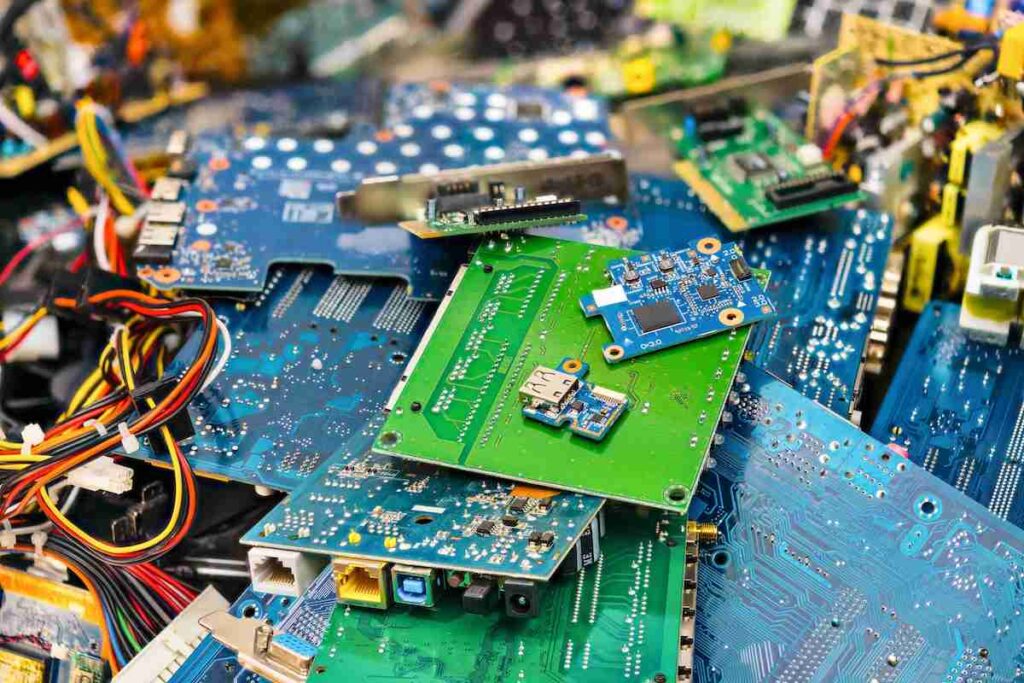Scottish researchers have discovered a new way to extract rare and valuable metals – including gold and silver – from waste electronics with a whisky-fuelled process.
Using a combined biological and chemical approach, scientists have created a more sustainable method for recovering reusable scrap metal from products such as TVs and laptops.
The environmentally-friendly approach uses whisky co-products to process the liquid waste leftover when the precious metals are extracted, to leave less precious but still valuable materials including aluminium, tin, and zinc.
Currently, the UK produces the second highest level of waste electronics, most of which is taken overseas for processing.
It is hoped the project could unlock new opportunities to re-use waste metals and drive greater value from waste products in Scotland.
The collaborative consortium is comprised of Aberdeen-based environmental tech company SEM, waste services provider WEEE Scotland, the University of Edinburgh, and the Industrial Biotechnology Innovation Centre (IBioIC).
Current physical and chemical extraction techniques are energy intensive or use solvents that are difficult to recycle to dissolve valuable metals from electronic circuit boards. The latter process generates large volumes of acidic liquid waste containing traces metals, which can be damaging to the environment.
The method developed by the group uses recyclable solvents to extract valuable gold and copper from printed circuit boards. Other metals – such as aluminium, tin, and zinc – can then be recovered separately from the effluent using SEM’s ‘Dram’ filtration system, making the discharge from the extraction process environmentally clean.
Dram is manufactured using co-products from the distillation of malt whisky. The filter captures metals that can be recovered in the form of metallic nanoparticles by microbes and then purified for re-use. The final effluent from the process is also suitable to be discharged into the environment.
There are three co-products created from whisky distillation; draff – the spent grain from the mash tuns, pot ale – the liquid residue from the wash still, and spent lees – the liquid residue from the spirit still.
Leigh Cassidy, lead scientist at SEM, said: “There are a number of methods for removing valuable metals from electronic waste, but they are largely chemical and physical which comes with an environmental cost. This project has proven the use of an approach that is more rooted in biology and, with that, is much more sustainable – each stage of the filtration process has a lower impact than if it was done in any traditional manner.
“We are now looking to build the system into WEEE’s operations and then take it to other sites, where processes can be made more environmentally friendly. The next stage will be commercialising the technology to full effect, and we are pulling together bids for funding to make that happen.”
Professor Jason Love from the University of Edinburgh said: “This exciting project has allowed us to marry chemical processes that separate valuable and critical metals from electronic waste with a biological filtration method that both maximises the metals recovered and minimises the overall environmental footprint.”
According to the UN’s Global E-waste Monitor 2020 report, in 2019 the UK produced the second highest level of electrical waste per capita at 23.9 kilograms – a total 1.6 million tonnes of waste electronics. Most of this waste is transported to Asia for processing, which also contributes to the environmental impact of electronic waste.
Once commercialised, the new filtration process could not only reduce the reliance on mining new metal resources for electronics, but also open up the opportunity for Scotland and the UK to drive more circular practices and create value from ‘e-waste’.
Liz Fletcher, director of business engagement at IBioIC, said: “With demand for electronics only likely to increase, this project is an incredibly important step forward in the treatment and management of e-waste. The consortium has designed a new approach to recovering metals for re-use that is significantly more sustainable than anything that has been done so far, underlining what can be achieved through collaboration.
“There is a huge opportunity for Scotland, and the wider UK, to lead the way in creating value out of used electronics and other waste streams through biologically based, sustainable methods. These materials need to be recycled and doing so could make a significant contribution to supporting our bid to become a net-zero nation by 2045.”
